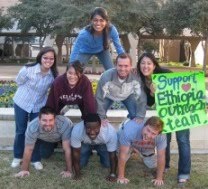Having spent the first two weeks of our trip familiarizing ourselves with the health care system in Addis Ababa and then trekking south into the Ethiopian countryside, the final week of our trip culminated in the offering of a free health clinic for the people of the rural town of Aleta Wondo. After some logistical cajoling, we were able to host the clinic at the Tena Tabia, Aleta Wondo’s own local health center. In the single room provided for us, our group set up four stations manned by two students each: an intake station, two “sick” stations, and a pharmacy. At the intake station, patients provided their name, age, and chief complaint before being sent to one of the sick stations, at which point the students recorded a patient history and performed any pertinent physical exams in anticipation of our faculty sponsor Dr. Richard Usatine’s final clinical assessment. Patients were then shuttled to the pharmacy to receive deworming pills for intestinal worms, a multivitamin, and any medications prescribed by Dr. Usatine. Throughout the process, we were assisted by a cadre of translators who deftly navigated the language barrier presented not only by Amharic, Ethiopia’s principal language, but also by the various dialects spoken in the countryside. Our thanks go out to all of the translators!
We went into our first day of clinic consumed with the archetypal fear of the unknown. For starters, we did not know how many people would show up. In performing a maternal health survey the previous week, we had informed the almost 200 women interviewed about our clinic, but it was impossible to know how many more people had been alerted by subsequent word of mouth. Perhaps more importantly, although the Tena Tabia itself is a free clinic, it is staffed primarily with nurses and public health workers. As we were told, our clinic would in all likelihood be the first time many of the people from Aleta Wondo would have the opportunity to be seen by a credentialed medical doctor—a fact which might inflate the demand for our services.
While Monday graced us with a manageable assembly of Ethiopians, tidings of our free clinic rapidly spread throughout the week, such that by Friday literally hundreds of people were gathering in mob fashion in front of our doors before we opened at 9 AM. It is difficult to describe in words the surreal experience of sifting through this throng. Men, women, and children of all ages would beg, yell, and even physically grab the poor student running intake tasked with the duty of choosing which patients would be seen by Dr. Usatine that day. Often times, these people would remove their shirts or pants without modesty or reservation to expose a rash or mass that the student might deem worthy of admission. Indeed, Wade and Annie suffered open wounds on their arms due to the clawing of several overly eager Ethiopians.
While the scene outside the building personified the quality of entropy, the setting within the walls of the clinic offered a more controlled sense of chaos. Amidst the constant chatter of patients, translators, students, and doctor, we treated a number of patients afflicted with a wide range of pathologies, many of which typically would not be seen in the United States. One of the most common disease types we saw was a skin infection, usually fungal but also bacterial. Most of these diseases could be cured with some combination of oral and/or topical antibiotics. Trachoma, a bacterial infection of the eye, was another prevalent illness. If left untreated, the disease will ultimately lead to blindness, so being able to cure trachoma with a single dose of antibiotics was particularly gratifying. Unfortunately, whether because of lack of resources or lack of treatment options, not every disease could be cured, but in total, we were able to see over 415 Ethiopians. Our thanks go out to Dr. Usatine who visited with every single one of these patients over the course of the week and never once seemed stressed with the burden of a constant patient flow.
Subscribe to:
Post Comments (Atom)

No comments:
Post a Comment